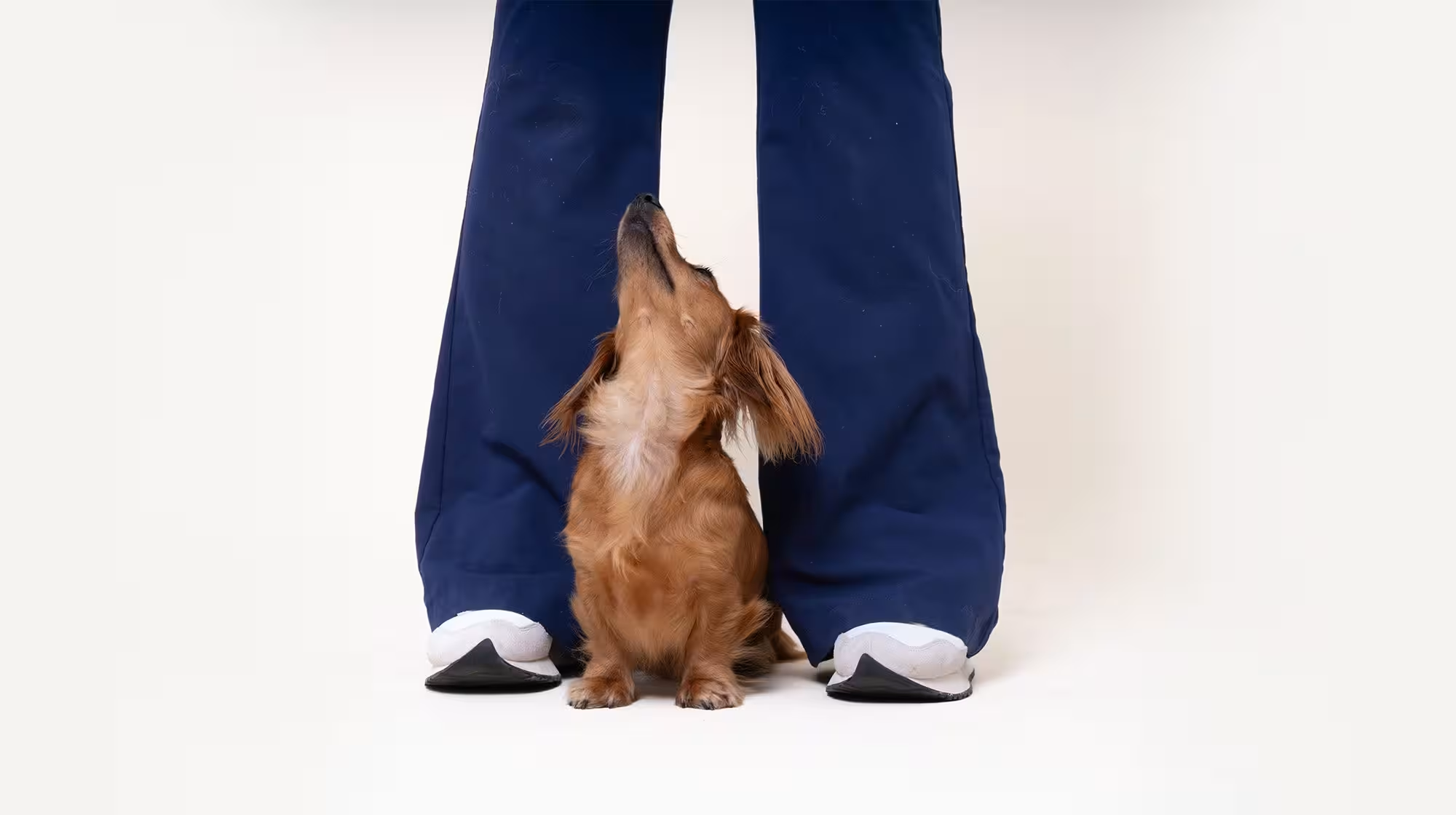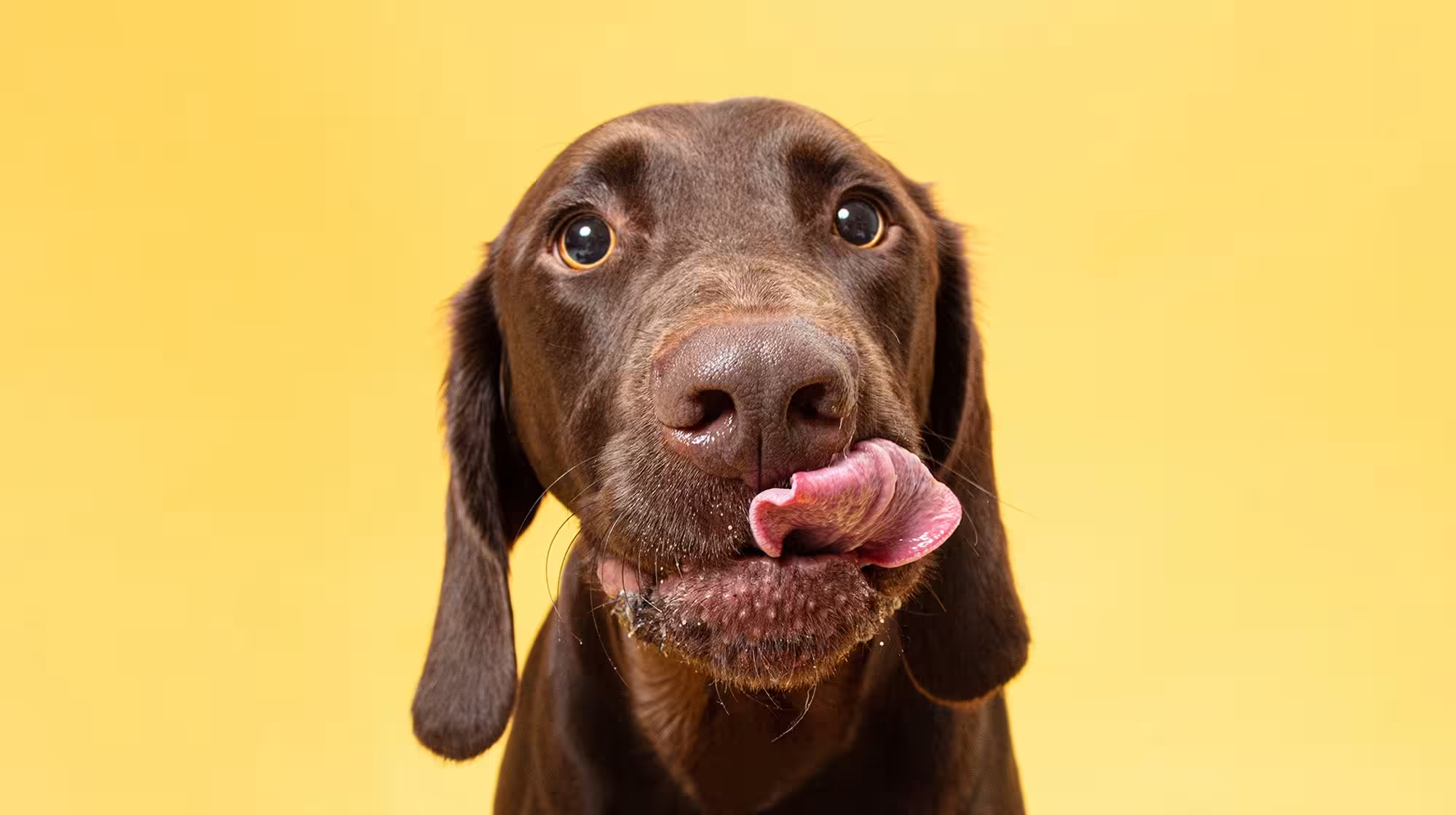The most common reason your dog often stares you down without breaking eye contact is as simple as - they love you!
However, there are a few reasons why your pooch might be making lingering eye contact with you, with even a scientific basis for why they like it so much.
If you’ve been wondering, ‘Why is my dog always staring at me?’ and ‘Is it healthy for my dog to stare so much?’ - we’ll answer all your questions here.
Reasons dogs stare at their owners
There are a few reasons why your dog stares at you, including:
Your dog loves you! The biggest reason your dog will stare at you is because of sheer love and devotion. You are your pooch’s best friend and companion, and looking directly into your eyes helps your dog feel safe, seen and cared for as well as strengthens the bond between you.
They want your attention. If your pooch is staring intently at you, they could want your attention - whether that’s praise, a head scratch, to go outside or a belly rub. In general, they may be feeling needy and just want a moment to bond with you.
You’re training them. Looking directly at you when you call is a big part of training exercises for dogs. The command, ‘look’ or saying their name is a way of ensuring your dog’s attention before you give further instructions - so if they’re looking at you in anticipation, they may be waiting for your go-ahead on something.
They’re hungry or want your food. If you are eating something, have treats on you, or your dog knows it’s soon time for lunch or dinner, you can guarantee they will be staring at you longingly as soon as those hunger pangs kick in. This is ‘begging’, when their head is slightly lowered but they look up pleadingly with their eyes. Likely, they will also nudge you with their nose or paw.
It's time for play. If your dog needs mental stimulation or they’ve been cooped up inside, or they just want some bonding time, they may be staring at you to instigate play. This might be accompanied by holding a toy or ball in their mouth, so you really get the message!
It’s time to go for a walk. Dogs thrive on routine. So when the time comes that they usually go out for a walk, they will lock in on your face to send the message.
They're anxious. Staring with intent can be a sign of anxiety or even separation anxiety in dogs. If they are always staring at you nervously, even when nothing is happening, it could be that they are pre-empting your movements, fearful you will get up and leave.
They’re angry and warning you. When dogs are showing aggression, they will stare with mostly the whites of their eyes as a warning signal. These are called ‘whale eyes’ and will usually happen if you’re approaching a dog you don’t know, or your dog is feeling threatened or overwhelmed. Step back if your pooch makes these eyes at you and wait for their body language to return to neutral.
They may have a health issue. A rare reason why your pooch is staring blankly and seems generally ‘not present’, is that it could be a sign of declining brain function, such as what happens during Cognitive Dysfunction Syndrome.

What is cognitive dysfunction syndrome in dogs?
Staring blankly is one of the symptoms of cognitive dysfunction syndrome (CDS) in dogs.
This is an age-related condition in which your dog’s brain function gradually declines, affecting their sensory awareness, recognition and memory, as well as generally slowing them down physically and mentally.
If your pooch tends to stare blankly, not just at you but at walls, objects or into the distance, you should take them to a vet to be checked over.
This is especially important if they also seem disorientated or confused when walking around the house, carrying out their regular routine.
What is the science behind dogs staring at you?
When a dog and their owner gaze into each other’s eyes, both of their oxytocin levels rise.
Oxytocin is known as the ‘bonding’ or ‘attachment’ hormone, the same chemical that rises when mothers bond with their babies.
It boosts trust and empathy between the dog and human, strengthening the bond between them and creating a sense of calm and contentment.

Should I discourage my dog from staring at me?
It’s not a bad thing if your dog stares at you a lot - as we’ve explained, it’s usually a sign of love and affection, and looking into your dog’s eyes strengthens the bond between you.
It can also help with training, as when your pooch looks at you on command, it means they trust you.
However, if your pooch is annoying you with begging, or they seem nervous and fearful while consistently staring at you, you could try distracting them with play, some calming dog treats , or a long-lasting chew (chewing reduces stress in dogs).
-

 from
fromCurrent price: £4.99
Calming Fish Hide Chews -

 from
fromCurrent price: £9.50
Fish Chews Bundle -

 from
fromCurrent price: £4.99
Long-Lasting Fish Hide Chews -

 from
fromCurrent price: £10.49
Meaty Treats Taster Pack -

 from
fromCurrent price: £3.99
Calming Postbiotic Meaty Treats -

 from
fromCurrent price: £3.99
Skin & Coat Postbiotic Meaty Treats -

 from
fromCurrent price: £3.99
Dental Postbiotic Meaty Treats -

 from
fromCurrent price: £3.99
Health & Digestion Postbiotic Fish Treats -

 from
fromCurrent price: £3.99
Cheddar Cheese Postbiotic Treats -

 from
fromCurrent price: £3.99
Peanut Butter Postbiotic Nutty Treats -

 from
fromCurrent price: £3.99
Puppy Beef Jerky Training Treat
When is my dog’s staring too much?
If your dog’s eye contact feels slightly ‘off’, or you’re worried it could be indicative of separation anxiety or a health issue such as cognitive dysfunction syndrome, then you should get in touch with your vet for advice.
Look out for other signs of distress, such as:
Crying or whimpering
Staring blankly or into the distance
They lack boundaries in other ways (climbing into your lap, excessive licking of your hands or feet, or being destructive when you’re not around).
FAQs
How do I stop my dog from staring at me?
Gazing into your eyes is a natural behaviour for a dog - it’s a way they connect with you, show they love you, and build trust.
You’ll need to accept some level of staring (and gaze at them back sometimes, to have them feel safe and calm), but if your pooch is staring all through the day or begging for your attention, you should try to distract them in other ways with treats, play or chews.
How to tell if a dog is staring aggressively?
If a dog is staring at you to warn you off, they will present ‘whale eyes’.
This is when mostly the whites of their eyes show, with little of the pupil and iris.
It will often be accompanied by baring of the teeth or snarling, and perhaps lowering of their body. Step back if a dog is staring at you in this way - it happens when they feel threatened or overwhelmed.
Are old dogs more likely to stare at things?
Senior dogs are more likely to stare blankly, either at their owners, objects or into the distance, as their brain function starts to decline. Chat to your vet if you’ve noticed this, as it could be a sign of cognitive dysfunction syndrome.
If you’re looking for ways to soothe your dog, try our Probiotic Meaty Treats , infused with meaty flavours and gut-boosting probiotics; or our natural and Long-Lasting Fish Hide Chews for a safe and satisfying chew session.












